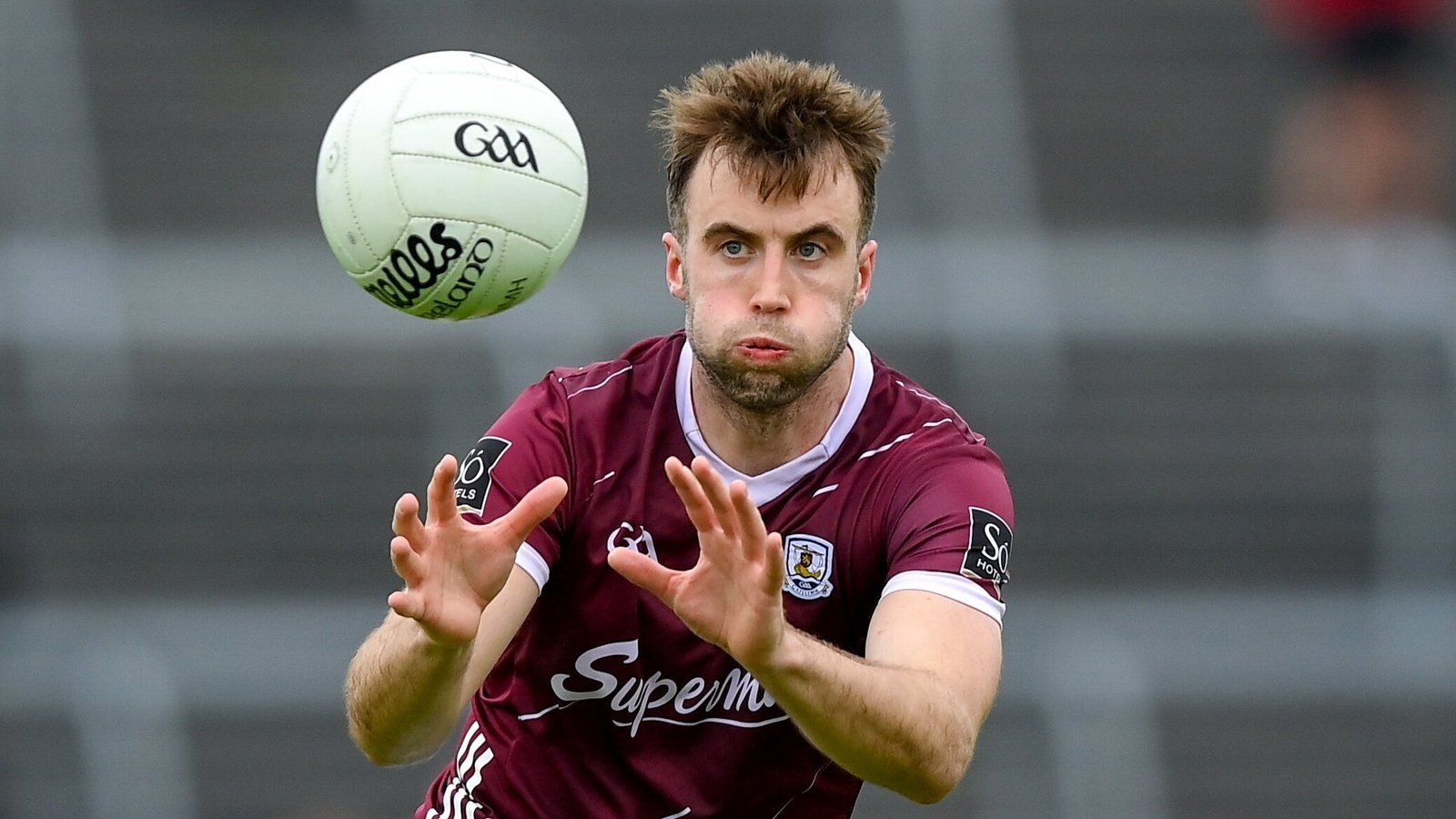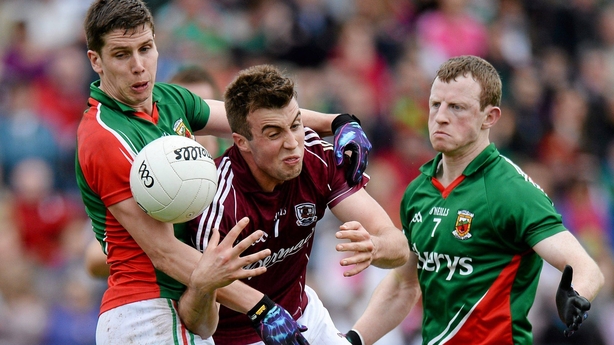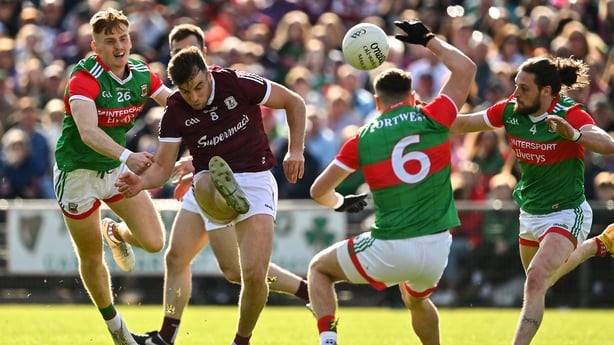Football
Venerable Conroy spans the epochs of Galway football

It was way back in the summer of 2008 when a 19-year old Paul Conroy came off the bench to score the effective winning point in his first Connacht final against Mayo.
There was still a Bush in the White House, the Celtic Tiger was supposedly due for a soft landing, and the late Sean Fitzpatrick was a revered master of the banking universe.
He’s soldiered through a few epochs of Galway football since then – one of them none too glorious – and recovered from a double leg fracture at the turn of his 30s, even spending a few weeks in a wheelchair.
In 2024, he’s been hoarding Man of the Match awards like an Irish back-row forward. “I’m a long time waxing lyrical about Paul Conroy,” said Padraic Joyce said after the Monaghan game. “I played with him, he’s around that long…”
Conroy collected his sixth Connacht medal this summer, a fairly typical haul for a Galway footballer of his longevity.
However, the tally becomes more impressive when you consider that the first half of his inter-county career was played out with Galway football mired in the doldrums and barely operating in the same postcode as their rivals to the north.
This at least partly goes to explain why Conroy has become one of the most celebrated current footballers with no All-Star to his name.
The 2008 campaign was initially greeted as a renaissance for Galway with Padraic Joyce revelling in his late-stage role as a centre-forward playmaker and Michael Meehan enjoying his finest campaign in maroon, giving his signature performance in the downpour against Kerry in the quarter-final.
A teenage Conroy came on stream with a six-point tally against Roscommon on his championship debut. The previous year, he’d captained Galway’s minors to their first All-Ireland in 21 years after a win over Derry (alongside Kildare, their favourite opponents).
Combined with the All-Ireland Under-21 titles in 2002 and 2005, the short-term picture looked healthy. Galway’s headline trophy haul at U21 level in the 2000s and early 2010s masked a general lack of consistency, in that every time they won the Connacht title at the grade, they also won the All-Ireland.
However, the ’08 season proved a false dawn. They regressed in 2009 and spent the next few years chopping and changing managers, sometimes half-heartedly embracing modern defensive tactics before reverting to type in response to the bellyaching of the locals. They fell into bouts of unproductive navel gazing regarding the geographical composition of the squad (north v west). The fact that the games were now in Salthill rather than Tuam was apparently another sore point in this dispute.
In the first two seasons of the 2010s, they had two managers – Joe Kernan followed by Tomás Ó Flaharta – and won one championship match, a scintillating seven-point win over New York.
Galway’s current manager played his final game in a second round qualifier loss to Antrim in 2012, an inauspicious farewell on a par with Jack O’Shea’s 20 years earlier.
By the early 2010s, Mayo had re-organised under James Horan and Galway struggled to keep it kicked out to them for a few years.
Conroy played all through this period, which rivalled the early 1990s for abject flatness.
The very public nadir arrived with the 17-point hammering at the hands of Mayo in the live televised Connacht championship game in 2013 – a match which heralded a new era of needle in the once cordial Galway-Mayo relationship.
At least the afternoon had the effect of shaking Galway out of their apathy – their previous horror-shows had occurred in Saturday evening qualifiers and were disposed of in short reports at the back end of The Sunday Game round-up. This disaster was front and centre.

Conroy, unlike several of his team-mates, was on the pitch for every second of that excruciating match. A few weeks later, his point-taking helped avert an even worse humiliation against Waterford.
The following spring, he scored 0-03 in a vital win over Armagh, which ultimately prevented Galway from tipping into Division 3.
“If I was Paul during those barren years, I would have really struggled to be in that panel,” says Lee Keegan, who tangled with him over the years. “They just seemed to be a team that were going nowhere. If you don’t see something at the end of the road, that’s a hard place to be in,”
“He’s been there year on year on year. And never complained about it. Just got on with it.”
At the end of 2014, Kevin Walsh arrived as manager and began, according to some accounts, walking the Galway players through the ABCs of modern defending.
While there were gradual improvements and decent qualifier wins in the preceding years, the 2016 Connacht campaign is usually taken to mark their official rebirth as a ‘player’ in the football championship.
On the same day that Ireland were smashed by Belgium in Bordeaux, an unfancied Galway side shocked Mayo in Castlebar, abruptly ending the latter’s era of total dominance in the province.
Conroy – the same as now, the same as always – chipped in with a couple of big points from distance, raiding forward to land the lead score after Tom Flynn’s goal.
A few weeks later, they devoured Roscommon in a replayed decider and Conroy finally had his second Connacht medal, eight years after the first.
The 2018 campaign was a successful one for Galway but a painful one for Conroy. In the inaugural round of Super 8 games, Galway beat Kerry in championship for the first time since the 1965 All-Ireland final but the midfielder was cooped up in a hospital bed by the final whistle.
After 20 minutes, with a score at 0-03 to 0-02 to Galway, he slid for a ball with Sean O’Shea, and came off much worse.
“It was just a really wet day and two of us kind of slid in,” Conroy recalled later on. “His knees hit my shins, unfortunately for me. It could easily have been him, like.”
The camera followed its usual nightmare injury protocol of focusing it’s gaze anywhere and everywhere but the stretcher. The Six One visited him in bed the following day and Seamus Coleman, who suffered a horrific leg break, rang him for a pep-talk during his long recovery.
“I think when they say breaking two legs, it doesn’t sound like something that would happen to you in a game of football,” Conroy told the Irish Independent later on.
“(Using a wheelchair was) tough, but it’s not the end of the world when you know you’re coming out of it.”
Ruled out for 2019 – the only campaign he’s missed since his debut – he worked himself back to full fitness in time for the Covid-campaign of 2020, kicking three from play in that winter’s Connacht final.
Conroy is a throwback in some respects, the darling of older supporters who are in a permanent state of bafflement as to why fellas don’t kick the ball over the bar from 40 yards. The scoring zone has wider proportions whenever he’s loitering.
He gave an absurd exhibition of long range point-kicking against Roscommon in Croke Park in 2022 – the slight caveat being that it was a de facto exhibition game, aka the Division 2 final. He scored 0-07 from play that day, a tally which might have been doubled under the current experimental rules.
In the autumn of his career, he was finally now on a side that could reasonably contend for the biggest prize, the strongest Galway football team since the O’Mahony era.

The phrase ‘Footballer of the Year form’ was in circulation after a magisterial second half display in Castlebar, when Galway held off Mayo by a point to kick-start a big summer push. Fifteen years after winning the minor title, Conroy finally appeared in an All-Ireland final.
His form had slightly tapered off by then. On a day when Shane Walsh and Cillian McDaid found freedom, Conroy was one of those well shackled. He wound up for a trademark booming shot at one stage in the first half but it was too easily telegraphed and Stephen O’Brien slid in behind for a diving block. He wasn’t moving terribly freely from then on and watched the tense closing stages from the dugout.
Having turned 35 in May, he’s enjoying one of his finest seasons to date, collecting the post-match crystal after the wins against Derry and Monaghan.
He’s gelling well in the middle with late developer John Maher, his effective and subtly skillful midfield partner. Together, they were the central figures in hauling Galway out of a potentially sticky situation in last weekend’s preliminary quarter-final.
“Paul works awful hard, always has,” his former manager Kevin Walsh said a couple of years ago. “He’s always worked hard on his body, he’s always first at training. He’s always consistently tried to get better. And he’s always been a good kicker.”
Maybe, like Patrick Horgan, he’s in a race to stick around long enough to nab the biggest prize and get out.
Or perhaps he’s waiting for the two-point arc to arrive so he can really come into his own.
Either way, there’s no talk of imminent retirement for Galway’s most experienced player, hitting unprecendeted heights in what should be the twilight of his career.
Watch The Saturday Game with highlights of the All-Ireland Football Championship quarter-finals on Saturday from 10.35pm on RTÉ2 and RTÉ Player










